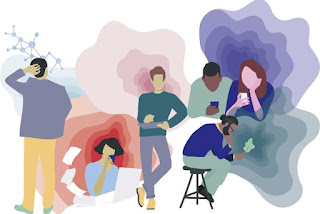Schizophrenia Explained: Early Warning Signs and Available Treatments
Schizophrenia is a chronic mental health disorder that
affects how a person thinks, feels, and behaves. Often misunderstood, it is
more than just a rare condition, impacting approximately 1 in 100 people
worldwide. Recognizing the early warning signs of schizophrenia and seeking
appropriate treatment is crucial for managing the condition and improving the
quality of life for those affected. If you are looking for a psychiatrist in
Bhopal,
understanding these signs can help in identifying potential risks early.
Early Warning Signs of
Schizophrenia
Schizophrenia typically manifests in late adolescence or
early adulthood, though symptoms can appear at any age. The early warning signs
may be subtle and can be easily overlooked or mistaken for other conditions.
Some common early indicators include:
1)
Social
Withdrawal: Individuals may begin to isolate themselves from family, friends,
and social activities. This withdrawal is often a precursor to more severe
symptoms.
2)
Changes
in Thinking and Speech: People may start to exhibit disorganized thinking,
making it difficult to follow conversations or express thoughts clearly.
3)
Suspiciousness
or Paranoia: A person may begin to distrust others, believing they are being
persecuted or that people are plotting against them.
4)
Difficulty
Concentrating or Functioning: A decline in academic or work performance,
coupled with difficulty focusing, is often a red flag.
5)
Hallucinations
and Delusions: Hearing voices or seeing things that are not present are classic
signs of schizophrenia. Delusions, such as believing one has special powers or
is being controlled by external forces, are also common.
Available Treatments
for Schizophrenia
While schizophrenia can be a challenging condition, it is treatable
with a combination of medication, therapy, and support. Early diagnosis and
intervention are key to managing the symptoms and helping individuals lead
fulfilling lives.
1) Antipsychotic Medications: These
medications are the primary treatment for schizophrenia, helping to manage
symptoms such as hallucinations and delusions. They work by balancing the brain
chemicals involved in the disorder.
2) Psychotherapy: Cognitive-behavioral
therapy (CBT) and other forms of psychotherapy can help individuals cope with
the challenges of living with schizophrenia. Therapy also aids in improving
social skills and managing stress.
3) Support Systems: Building a strong
support system, including family, friends, and mental health professionals, is
essential for recovery. Community-based programs and rehabilitation services
can offer long-term support.
If you or someone you know is showing signs of schizophrenia,
seeking help from a psychiatrist in Bhopal can make a significant difference in managing the condition.
With the right treatment plan, people with schizophrenia can lead productive
and meaningful lives, despite the challenges they face.



Comments
Post a Comment